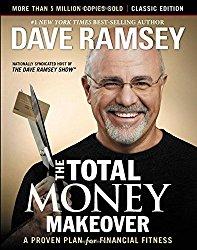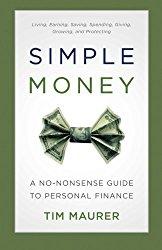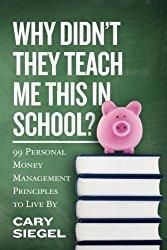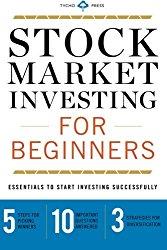I have a huge amount of respect for Dave Ramsey. I discovered him soon after I moved to Tennessee in 1998. At that time we had just bought a new Jeep Cherokee and were making car payments. I also had a couple of credit cards that I was paying off every month, which seemed to be working for me, until it wasn't.
After I started listening to Dave Ramsey, we started paying off the car faster, paying it off in about three and a half years instead of the original six we were signed up for. We then refinanced the mortgage from a 30-year to a 15-year, taking advantage of the lower interest rates, then paid if off in about 12 years, saving probably a hundred thousand dollars in interest. Thanks to Dave, we were on great financial footing by the time we reached our mid-thirties, despite starting off "normal," as Dave would say, which meant that we were in debt with a car payment, spending money as fast as it came in. (At least we never had credit card debt since we were paying the cards off each month.)
Pick up a copy of Dave's book if you're perpetually in debt beyond your mortgage and get started on your debt snowball - it can change your life:


I still held onto the credit cards since they did not seem to be hurting anything and we were getting a little cash back. One day, however, I opened up a bill and discovered that I had been charged a bunch of interest, basically wiping out the cash back I was getting. What had happened was that I had written a check for the full amount, something like $1759.65, but had mis-written the line where you write out the amount of the check. The box said $1759.65, but the line said "One-thousand fifty-nine and 65/100s." I had left out the seven hundred.
I'm sure that the people who received the check noticed the mistake, but didn't call and tell me, letting me think that I had paid off the balance in full. The credit card company ( Bank of America) decided instead to cash the check for the lesser amount, then charge me for interest for the first month and the next month since I had not paid the amount in full. Because I had particularly a large balance the next month, the interest came out to several hundred dollars! At best I was getting a hundred dollars or so a year in rewards. Needless to say, I was fairly upset. When the company refused to refund the interest, I cancelled the card, sending in a check large enough to make sure I paid off the balance so that I wouldn't continue to be hit with interest.
At that point I swore off credit cards, instead using only cash and a debit card for about eight years as Dave Ramsey advised. Rewards cards were nice for the free stuff, but they're ready to zing you if you make one mistake. There is also the danger of purposely letting yourself carry a balance during an emergency event in your life. Once you fall into that hole, while you think you'll just pay everything off and be done with debt, things usually just keep happening to make you fall back in. It is difficult to climb your way out.




A couple of years ago I did get a credit card again, but this time it is on automatic payment from my brokerage account such that they automatically pay it off in full each month. So far this has mainly worked out, although I am still somewhat leery. The only thing I don't like about it is that they wait until the last-minute to pay off the card, allowing the balance to build up as I add charges for the next month, such that the balance can grow with time and even start to threaten to bump the credit limit if I've had some big charges. I go in every so often and make a special payment to send it back to $0 to keep this from happening.
A few days ago, a gentleman from US News and World Report contacted me, saying that they had done a survey and written a piece on rewards cards, including how to select the best ones and how to manage these cards and was wondering if I wanted to include a link to it in my blog. At first I was a bit leery to reference the report since I certainly don't want to promote everyone rushing out and loading up on rewards cards since they really can bite you, but I was impressed once I read the piece in that they constantly made the reminder that you really need to pay the balance each month if you want to be "rewarded." If you carry a balance, the value of any rewards will quickly be swallowed up by interest payments. It also does give some good information on how to select the right rewards card for you if you are so inclined.
The U.S. News & World Report's 2017 rewards credit card survey and guide can be viewed here:
So if you do decide to get a rewards credit card, here are some things that I would suggest to help protect yourself from ending up in a bad place a few years later:
- Make sure you have an emergency fund, meaning 3-6 month's worth of expenses, saved away in cash to handle the little emergencies that come up. Having a credit card for an emergency is a bad plan since that is how people often start to get into serious debt. Instead, have the cash you need to cover things that come up before the next payday.
- Have as fool-proof a way as possible to make sure the bill is paid on time each month. Credit card companies purposely make you wait until after a certain day in the month before you can pay the minimum payment to increase the chances that you'll pay late. Watch out for their games that are designed to get you paying interest and penalties. Some people send in a check or do a transfer as soon as they make a purchase. Using automated payment seems to be working for me.
- Don't ever let the teaser rates cause you to decide to carry a balance. If you are late with a payment for any reason, and sometimes if you are late in paying another card or even your mortgage payment, they can jack your rates up to 25% or more. There is no reason to carry a balance on a credit card, ever.
- Still use cash to help control your spending. For most people, spending with credit is painless, where paying with cash hurts. This means that people spend more with plastic than they will with cash, even when using a debit card. That is why the fast food chains are now taking credit cards even though they pay a fee when they do. The amount extra that people spend when using plastic more than makes up for the fees. While your impulse may be to put everything on the card to maximize your rewards, it is still a good idea to use cash for things like dinners out where you may be tempted to blow your budget if you don't feel a little pain when the bill comes.


Follow me on Twitter to get news about new articles and find out what I'm investing in. @SmallIvy_SI
